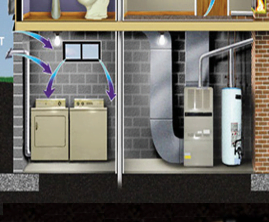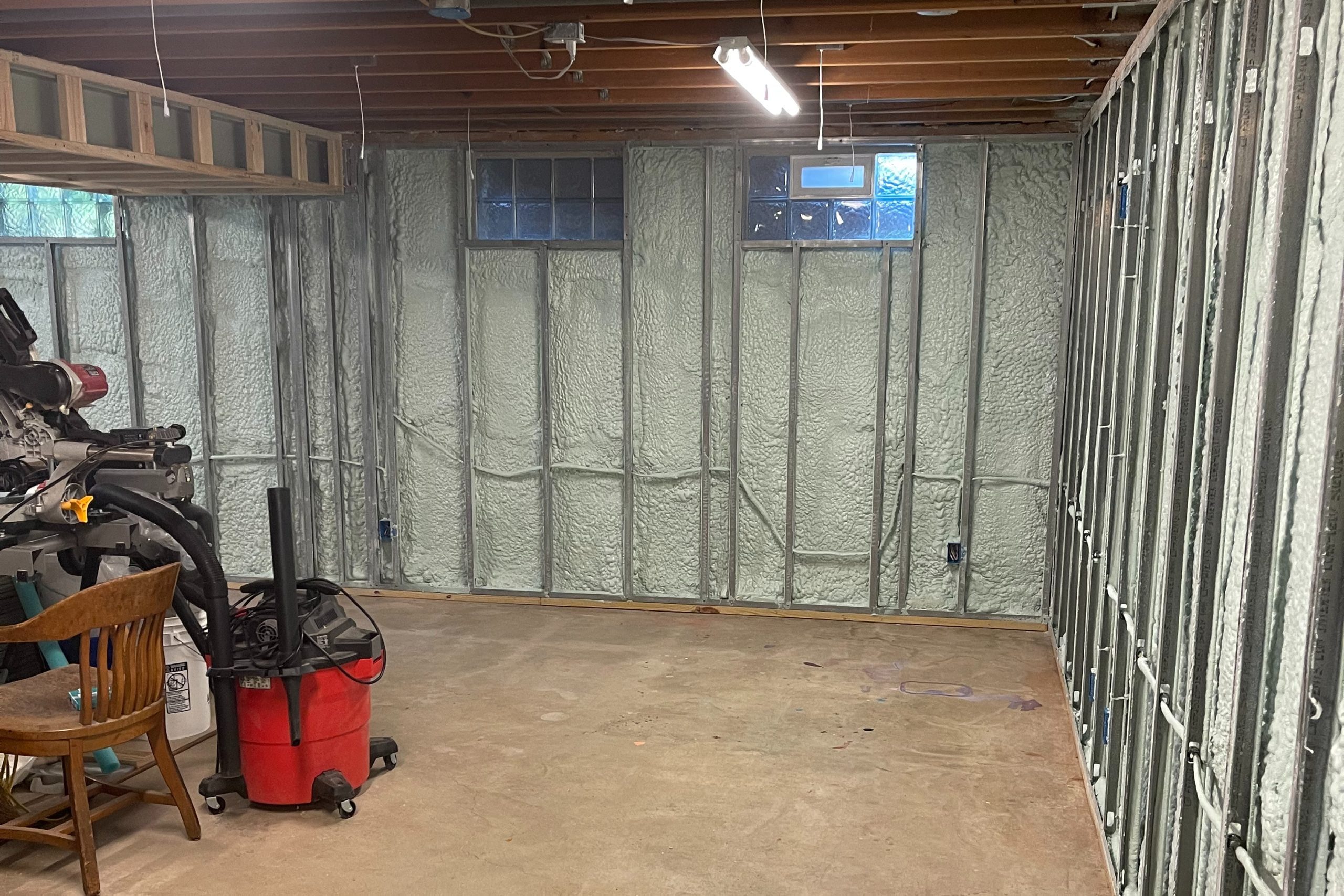Insulating a basement properly is critical for moisture control, energy efficiency, and comfort in your home. While fiberglass batts were once the go-to, spray foam insulation has become a top choice for basement applications.
Spray foam can seamlessly seal cracks, insulate rim joists, and create a thermal and moisture barrier on foundation walls. If you’re curious as to what spray foam insulation offers, let’s dive in.
What is Spray Foam Insulation?
Spray foam insulation is a two-part liquid compound that expands and hardens when mixed, forming a rigid plastic foam. The foam expands 30-60 times its liquid volume after application, conforming and adhering to all surfaces and spaces.
There are two main types of spray foam to consider:
- Closed-cell spray foam insulation has a higher density at around 2 pounds per cubic foot. It provides an R-value of 6.0-7.4 per inch, forming an excellent air and moisture barrier. Closed-cell foam is preferred for basement applications.
- Open-cell spray foam is less dense at 0.5 pounds per cubic foot. It has an R-value of 3.5-4 per inch. Open-cell foam allows more vapor permeability while still insulating and air sealing.
Both types of spray foam are applied by professional contractors using special equipment to mix and spray the liquid components. The foam cures and hardens within minutes after application.
Benefits of Using Spray Foam in Basements
Applying spray foam insulation in basements provides superior performance compared to other insulation methods. Key benefits include:
Moisture Control
Spray foam forms an air-tight seal that prevents condensation and moisture buildup in basements. It adheres tightly to surfaces, sealing cracks, gaps, and penetrations that allow water vapor to enter the space. Closed-cell foam blocks moisture migration.
Proper insulation increases the temperature of basement walls and floors, reducing condensation potential. This prevents mold, mildew growth, and rotting.
Energy Efficiency
Closed-cell spray foam has an exceptionally high R-value of up to R-7.4 per inch, providing excellent thermal performance for basements. It insulates rim joists, walls, and ceilings with no gaps or compressed areas. This reduces heat loss and drafts, lowering energy bills.
Durability
Spray foam insulation is designed for long-term performance. Once cured, the rigid foam will not shift, settle, or decompose over time. It has an expected lifespan of over 50 years.
Fiberglass batts and other insulation materials are prone to sagging, compression, and creating gaps that reduce performance. Spray foam maintains its insulation capacity over decades.
Air Sealing
Air infiltration accounts for up to 40% of heat loss in homes. Spray foam insulation expands and seals all gaps and cracks as it cures. This “air seals” the basement, preventing outdoor air, pollutants, radon gas, dust, and allergens from entering the space.
Versatility
Spray foam can adhere to any surface material and fit into any crack or space. Contractors can insulate rim joists, ceilings, walls, electrical boxes, pipes, ductwork, and other areas that traditional fiberglass cannot reach effectively. It provides complete insulation coverage with no gaps.
Mold Resistance
The closed-cell structure of spray foam resists moisture and vapor penetration into wall assemblies. It does not support mold growth or rotting when properly applied. The airtight seal prevents spores and allergens from entering as well.
Key Applications for Spray Foam Insulation Basement
While spray foam can be used in many areas, below are the most important basement applications. Note that spray foam insulation cannot be sprayed into closed wall cavities because it expands too fast and is too thick.
Here are some great applications for installing spray foam insulation:
Rim Joists
The rim joist is the critical interface between a home’s framed walls and the foundation. It is prone to air leaks, moisture issues, and heat loss. Sealing and insulating rim joists with spray foam stabilizes temperatures and humidity in a basement. It also improves comfort by eliminating drafts.
Foundation Walls
Insulating basement foundation walls keeps interior floors warmer and reduces condensation. Closed-cell spray foam applied to wall surfaces creates a thermal, air, and moisture barrier.
Floor Joists
Applying spray foam to the underside of basement floor joists prevents heat loss through the floor above. This is recommended for conditioned basements to maintain comfortable temperatures.
Ductwork
Encapsulating ductwork in spray foam minimizes leaks, preventing cooled or heated air from escaping before reaching vents. This increases HVAC efficiency.
Plumbing Pipes
Insulating water pipes with spray foam protects against freezing in cold climates. It also minimizes condensation that can lead to mold growth.
Additional Applications for Spray Foam
While basements are a major use case, spray foam insulation provides high performance in other areas as well:
Attics
Applying spray foam in attics seals small cracks and gaps between roof rafters. It insulates and “tents” the underside of the roof deck, preventing condensation buildup. Using spray foam instead of batt insulation in attics improves energy efficiency.
Exposed Walls
Adding a 1-2 inch layer of closed-cell spray foam over existing wall insulation provides an additional moisture and air barrier. This improves insulation effectiveness in exposed wall cavities.
Factors Affecting the Cost of Spray Foam Insulation
There are a range of factors that affect the cost of spray foam insulation. The best way to determine the cost is to request a quote from a reputable contractor.
In the meantime, here are some factors that inform the cost:
- Type of Spray Foam: Closed-cell foam is typically more expensive than open-cell foam due to its higher R-value and density.
- Area to Be Insulated: The total square footage that needs to be insulated is a significant factor. Larger areas will require more materials and labor, which can increase the cost.
- Thickness of Insulation: The thickness or depth of the insulation applied can affect the cost. A thicker layer of foam will require more material and time to install, leading to higher costs.
- Location and Accessibility: The location of the area to be insulated can impact the cost. Areas that are difficult to access or require additional preparation work may cost more.
- Energy Efficiency Goals: If you have specific energy efficiency goals or requirements, it may affect the type and thickness of foam needed, which can impact the cost.
- Existing Insulation Removal: If you need to remove old insulation before applying spray foam, this can add to the cost of the project.
- Building Design: The architectural design and layout of your building can influence the complexity of the installation, affecting the cost.
Choosing a Spray Foam Insulation Contractor
Hiring a qualified professional contractor is highly recommended for basement spray foam applications. Poor quality installation can result in issues down the road.
Here’s how to select the best contractor for your project:
- Verify Licenses and Certifications: Contractors should carry all required licenses, insurance, and training credentials required in your state for insulation installation.
- Request Project References: Ask to see examples of past basement insulation jobs. Call references to confirm quality and service.
- Review Their Process: A reputable contractor will have a clear project process from inspection to installation to cleanup. Understand the full scope before work begins.
- Compare Multiple Bids: Get quotes from at least 3 contractors for your project. Compare materials, estimated insulation R-Values, warranties, and total costs.
The Bottom Line
Improving basement insulation with spray foam should be strongly considered for any home renovation project. Stopping air and moisture infiltration provides long-term benefits for energy efficiency, comfort, and indoor air quality.
While spray foam carries a higher upfront cost than some other insulation, the premium performance and decades of expected life make it a smart investment for maximum return. By hiring a professional certified contractor, you can ensure your basement will remain comfortably conditioned for years to come.
Look to Cincinnati RetroFoam for Your Insulation Needs
Are you seeking basement spray foam insulation? The team at Cincinnati RetroFoam is here to help. We proudly serve the Tri-State area with quality insulation services you can’t find anywhere else. Our team is committed to creating a more comfortable space for you.
In addition to spray foam insulation, we also offer blown-in and injection foam services. We can work on existing homes, new construction, commercial properties, and pole barns. Request your quote today to get started!
Frequently Asked Questions
How long does spray foam last?
Spray foam has a long lifespan of over 50 years when properly installed. It will not degrade or compress over time.
Does spray foam need additional vapor barriers?
Closed-cell spray foam acts as its own vapor barrier when installed at the recommended thickness. Additional vapor retarders are generally not needed.
Can spray foam get wet?
Occasional minor moisture will not affect cured spray foam. However, constant water exposure from leaks or flooding can damage foam over time. Moisture issues should be fixed prior to insulation.


